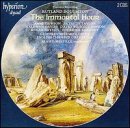| All Artists: Rutland Boughton, Alan G Melville, English Chamber Orchestra, Roderick Kennedy, Anne Dawson, Patricia Taylor, Maldwyn Davies, David Wilson-Johnson, Roger Bryson, Geoffrey Mitchell Choir Title: The Immortal Hour - Rutland Boughton (Hyperion) (2 CDs) Members Wishing: 1 Total Copies: 0 Label: Hyperion UK Release Date: 9/10/1992 Album Type: Import Genres: Jazz, Classical Styles: Historical Periods, Modern, 20th, & 21st Century Number of Discs: 2 SwapaCD Credits: 2 UPC: 034571161013 |
Search - Rutland Boughton, Alan G Melville, English Chamber Orchestra :: The Immortal Hour - Rutland Boughton (Hyperion) (2 CDs)
 | Rutland Boughton, Alan G Melville, English Chamber Orchestra The Immortal Hour - Rutland Boughton (Hyperion) (2 CDs) Genres: Jazz, Classical |
Larger Image |
CD Details |
CD ReviewsDark, Disturbing, but profoundly beautiful work Roger Mastrude | 09/03/1999 (5 out of 5 stars) "An epic opera based on the writings of William Sharp (writing under his pseudonym of Fiona Mcleod). The opera is strongly rooted in the Irish myths of the sidhe (the Celtic Faeries). It is a dark, brooding & exquisitely beautiful work, with much to teach, incidentally, about Pagan mythology. This recording certainly does justice to Boughton's work, which is just as well, as the chances of a production being staged seem remote, to say the least." A wonderful opera Roger Mastrude | Capitola, CA USA | 07/06/2002 (5 out of 5 stars) "This is a magical work in a late Wagnerian idiom. I don't mean bombastic, it's just a fluent, entirely integrated, richly-orchestrated work. This opera is almost completely forgotten, but it's life-enriching. Amazingly, Berkeley Opera did a production a few years ago. If you try this work, I sincerely hope you will get as much from it as I have. For those who do find they like it, I highly recommend Walter Braunfels' opera The Birds, as well as Busoni's and Korngold's music." A BYWAY OF ENGLISH OPERA WELL WORTH INVESTIGATING Klingsor Tristan | Suffolk | 05/09/2007 (5 out of 5 stars) "What if Richard Wagner had been quintessentially English? Now there's a thought. Would he have been like Rutland Boughton - nice, sometimes appealing, but rather ineffectual? Or would he still have been a despot and a monster?! On the surface, they had a lot in common. One was a wanted and exiled left-wing revolutionary who later wanted performances at his own theatre reserved for `ordinary working people', the other a committed socialist who wanted his music to be appreciated and be useful to the `working man' (his choral piece, Bethlehem, was first performed in modern dress as an act of solidarity with the miners and with the General Strike of 1926). One founded a Festival and a theatre on a Green Hill in Bavaria, revolutionary in its acoustics and in the works that were to be performed there, the other wanted to found a similar Festival on the Somerset Levels near a Green Hill/Tor at Glastonbury, a grandiose scheme that barely got off the ground. The key work to be performed at the first opera house was a massive 4-evening cycle based on Germanic myths, the key work for the other festival was to be a cycle of 5 operas based on the English Arthurian myths. The one developed the very Germanic theory of `Gesamtkunstwerk', the other the very English theory of `Choral Drama'.
It all leaves one feeling a little underwhelmed by Boughton, despite his ambitions. Yet he wrote the opera that had more consecutive performances than any other serious opera anywhere in the world. That was The Immortal Hour, first produced at his inaugural Glastonbury Festival in 1914 and later to run for 216 consecutive performances in London (+ another run of 160 performances the following year). In its day, it was as popular as a Lloyd Webber musical. And, if not in the Wagner class, it's a heck of a sight more musically interesting than Lord L-W. Admittedly, the Boughton symphonies and concerti are often let down by less than riveting basic melodic and thematic material. That's not true of the opera. Many of the motifs here really stick in the memory, not least the haunting evocation of `The Immortal Hour' itself. There are memorable arias and set-pieces, too. The song, "How beautiful they are, the lordly ones' became something of a party-piece for tenors between the wars. But Midir's big aria when he reminds Etain of her fairy history is a wonderful piece of invigorating vocal writing. Dramatically the piece is flawed, it's true. Boughton lacked Wagner's ability to turn intractable dramatic material into tautly structured, psychologically penetrating music-drama. The Dalua Prologue is atmospheric but overlong. The knees-up at the court of King Eochaid also outstays its welcome (but, then, the same might be said of The Meister's Grail Knights!). But the scene in the peasant's hut when Eochaid and Etain fall for each other and the final scene when Midir lures Etain back to the Land of Faery and leaves her husband heartbroken are both moving and musically very satisfying. The opera really didn't deserve the descent into total obscurity it suffered after the War. This recording helped to revive a limited renaissance in interest in Boughton's works. It probably remains the most satisfying of them and that makes it well worth listening to. Alan G. Melville and the ECO play the music as thought they believe in it and the result is uplifting and satisfying. Standing out among the singers are David Wilson-Johnson as King Eochaid and Maldwyn Davies as Midir. If you have any interest in the byways of English opera before Grimes, this is a disc well worth investigating." |
